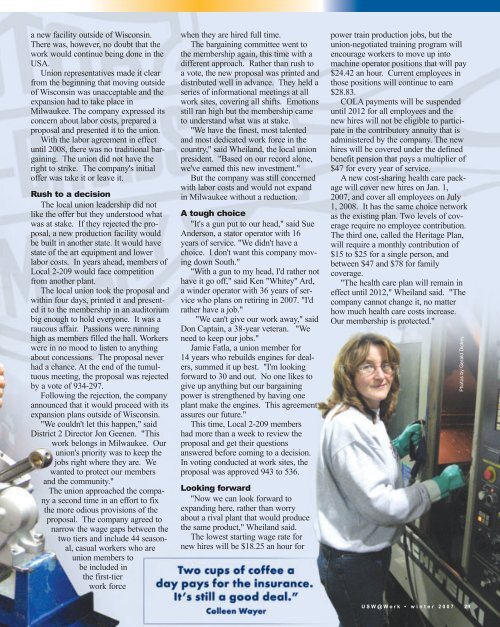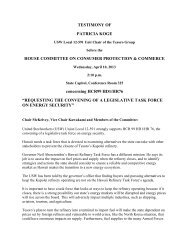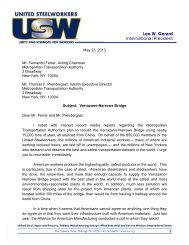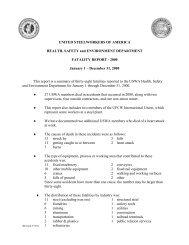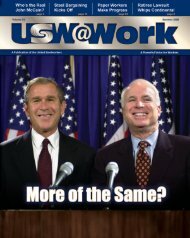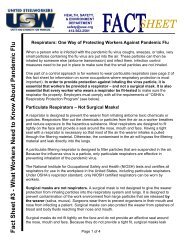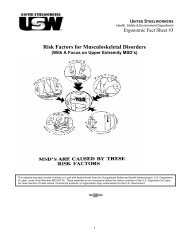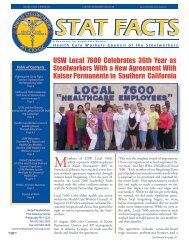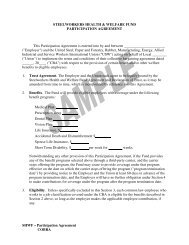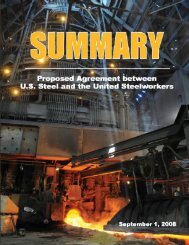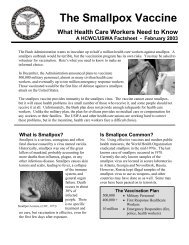USW@Work - National College Players Association - United ...
USW@Work - National College Players Association - United ...
USW@Work - National College Players Association - United ...
- No tags were found...
You also want an ePaper? Increase the reach of your titles
YUMPU automatically turns print PDFs into web optimized ePapers that Google loves.
a new facility outside of Wisconsin.There was, however, no doubt that thework would continue being done in theUSA.Union representatives made it clearfrom the beginning that moving outsideof Wisconsin was unacceptable and theexpansion had to take place inMilwaukee. The company expressed itsconcern about labor costs, prepared aproposal and presented it to the union.With the labor agreement in effectuntil 2008, there was no traditional bargaining.The union did not have theright to strike. The company's initialoffer was take it or leave it.Rush to a decisionThe local union leadership did notlike the offer but they understood whatwas at stake. If they rejected the proposal,a new production facility wouldbe built in another state. It would havestate of the art equipment and lowerlabor costs. In years ahead, members ofLocal 2-209 would face competitionfrom another plant.The local union took the proposal andwithin four days, printed it and presentedit to the membership in an auditoriumbig enough to hold everyone. It was araucous affair. Passions were runninghigh as members filled the hall. Workerswere in no mood to listen to anythingabout concessions. The proposal neverhad a chance. At the end of the tumultuousmeeting, the proposal was rejectedby a vote of 934-297.Following the rejection, the companyannounced that it would proceed with itsexpansion plans outside of Wisconsin."We couldn't let this happen," saidDistrict 2 Director Jon Geenen. "Thiswork belongs in Milwaukee. Ourunion's priority was to keep thejobs right where they are. Wewanted to protect our membersand the community."The union approached the companya second time in an effort to fixthe more odious provisions of theproposal. The company agreed tonarrow the wage gaps between thetwo tiers and include 44 seasonal,casual workers who areunion members tobe included inthe first-tierwork forcewhen they are hired full time.The bargaining committee went tothe membership again, this time with adifferent approach. Rather than rush toa vote, the new proposal was printed anddistributed well in advance. They held aseries of informational meetings at allwork sites, covering all shifts. Emotionsstill ran high but the membership cameto understand what was at stake."We have the finest, most talentedand most dedicated work force in thecountry," said Wheiland, the local unionpresident. "Based on our record alone,we've earned this new investment."But the company was still concernedwith labor costs and would not expandin Milwaukee without a reduction.A tough choice"It's a gun put to our head," said SueAnderson, a stator operator with 16years of service. "We didn't have achoice. I don't want this company movingdown South.""With a gun to my head, I'd rather nothave it go off," said Ken "Whitey" Ard,a winder operator with 36 years of servicewho plans on retiring in 2007. "I'drather have a job.""We can't give our work away," saidDon Captain, a 38-year veteran. "Weneed to keep our jobs."Jamie Fatla, a union member for14 years who rebuilds engines for dealers,summed it up best. "I'm lookingforward to 30 and out. No one likes togive up anything but our bargainingpower is strengthened by having oneplant make the engines. This agreementassures our future."This time, Local 2-209 membershad more than a week to review theproposal and get their questionsanswered before coming to a decision.In voting conducted at work sites, theproposal was approved 943 to 536.Looking forward"Now we can look forward toexpanding here, rather than worryabout a rival plant that would producethe same product," Wheiland said.The lowest starting wage rate fornew hires will be $18.25 an hour forpower train production jobs, but theunion-negotiated training program willencourage workers to move up intomachine operator positions that will pay$24.42 an hour. Current employees inthose positions will continue to earn$28.83.COLA payments will be suspendeduntil 2012 for all employees and thenew hires will not be eligible to participatein the contributory annuity that isadministered by the company. The newhires will be covered under the definedbenefit pension that pays a multiplier of$47 for every year of service.A new cost-sharing health care packagewill cover new hires on Jan. 1,2007, and cover all employees on July1, 2008. It has the same choice networkas the existing plan. Two levels of coveragerequire no employee contribution.The third one, called the Heritage Plan,will require a monthly contribution of$15 to $25 for a single person, andbetween $47 and $78 for familycoverage."The health care plan will remain ineffect until 2012," Wheiland said. "Thecompany cannot change it, no matterhow much health care costs increase.Our membership is protected."Photos by Gerald Dickey.<strong>USW@Work</strong> • winter 2007 29


